Realizing Children’s Rights in Dominica
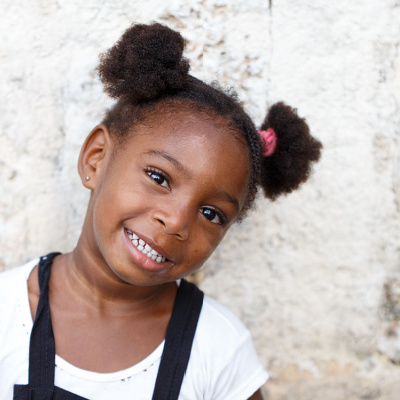
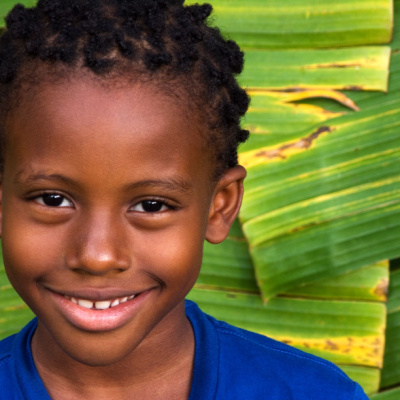
The Commonwealth of Dominica is an island located in the Caribbean Sea. With a territory mainly covered by tropical forest, isolated and with a predominantly rural population, Dominica is confronted with several challenges when it comes to the realization of children’s rights.
Population: 71 991
Pop. ages 0-14: 25.1 %
Life expectancy: 78.2 years
Under-5 mortality rate: 20.8 ‰
Dominica at glance
The Commonwealth of Dominica, also known as Dominica, is a parliamentary democracy located on a volcanic island in the Caribbean Sea, neighbored by the French islands of Guadeloupe and Martinique. Due to its ideal location as an entry point to the American continent, Dominica was a strategic territory for colonizing powers. After being subjected to the colonial powers of Spain, France, and Great Britain, the Commonwealth of Dominica became independent in 1978.
Known as the “Nature Island of the Caribbean”, Dominica is largely covered by rainforest, with its two primary population centers located on its coast. Dominica ranks 94th out of 189 on the Human Development Index which focuses on the respect and implementation of human rights (UNDP, 2020).
Status of children’s rights [1]
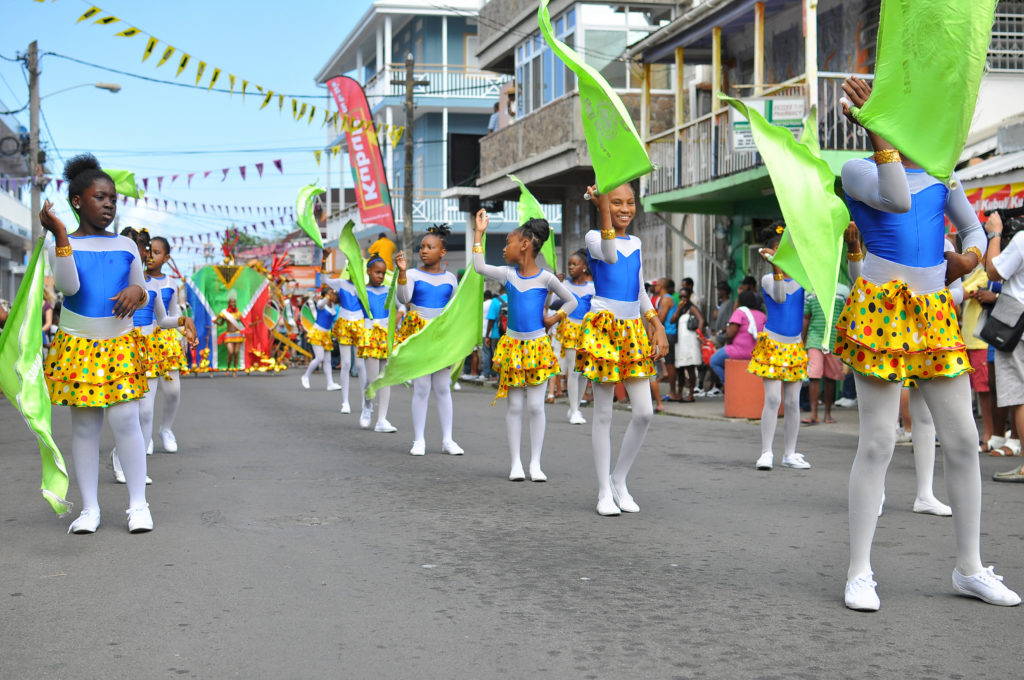
Children in Dominica are protected under the Children and Young Persons Act (Children and Young Persons Welfare Act, 1972). At the international level, Dominica has ratified the main international Conventions, among which the Convention on the Rights of the Child, including the Optional Protocol on Armed Conflict and the Optional Protocol on the Sale of Children, Child Prostitution and Child Pornography, and the International Convention on Child Labour.
Addressing the needs of children
Right to education
Access to education in Dominica is governed by Education Act No.11, enacted in 1997 (Education Act, 1997). Dominica provides free access to education for all children from pre-kindergarten to the secondary level (UNGA, 2019).
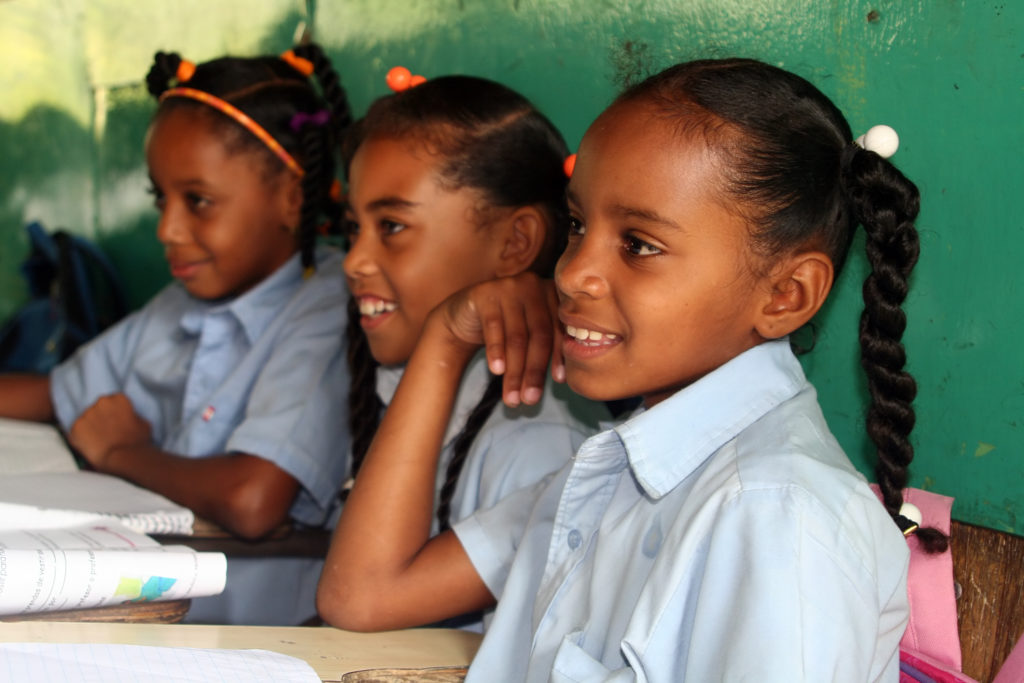
In order to cope with difficulties faced by children and young people in rural and remote areas, the government has launched several programs, such as the “Child Friendly Schools Initiative’ which provides children with additional funding in order to afford public transportation to and from schools, and covers various fees (school materials, clothing, etc.) (UNGA, 2019). Additionally, the “One University Graduate Per Household” policy serves an ambitious effort to promote education with a number of Dominicans being granted a scholarship to pursue their studies abroad in partner States, such as Cuba, China, and Mexico.
Right to health
Despite women and children having access to healthcare facilities, Dominica is still facing significant challenges, as reported by UNICEF(UNICEF, Situation analysis of children- Commonwealth of Dominica, 2017). However, the lack of data makes any analysis of the underlying issues a difficult endeavor.
When one looks at children specifically, recent years have shown an increase in overweight and obese children, to the extent that half of the Dominican population either suffers from overweight or obesity due to a lack of a balanced diet (UNICEF, Situation analysis of children- Commonwealth of Dominica, 2017). Children also suffer from alcohol, tobacco and drug use, which is detrimental to their health.
Dominica does not have a minimum drinking or smoking age, and also lacks services for drug addiction and abuse (UNICEF, Situation analysis of children- Commonwealth of Dominica, 2017). A 2010 survey showed that over 60% of children aged between 13-17 years old consumed alcohol in the previous year and over 25% of males in that age bracket used drugs at least once (UNICEF, Situation analysis of children- Commonwealth of Dominica, 2017).
Right to justice
Children are dealt with in Juvenile Court and tried separately from adults (UNGA, 2019). The creation of a separate justice system was a major achievement for the realization of children’s rights as in the past, Dominica has been severely reprimanded for not having such a system, and allowing children to be tried in the same manner as adults. Dominica has also passed several laws translating international normative obligations into national law. However, several of those bills have not taken effect yet, and are thus not enforceable (UNICEF, 2021).
Risk Factors → Country-Specific Challenges
Child abuse
Physical abuse of children, in the form of corporal punishment, is, to this date, a well-established and lawful practice in Dominica. Indeed, several legal acts provide for corporal punishment as an adequate way to discipline children. From the outset, Article 5 of the Children and Young Persons Act prohibits violence against children. However, the last paragraph of the said article provides that “nothing in this section shall be construed as affecting the right of any parent, teacher or other person having lawful control or charge of a juvenile to administer reasonable punishment to him” (Children and Young Person Act, 1991).
Article 49 of the education act further recalls that “corporal punishment may be administered where no other punishment is considered suitable or effective”, though excluding punishments considered as “degrading or injurious”. Corporal punishment can further be found in the juvenile justice system as a proper form of punishment. The Juvenile Offenders’ Punishment Act 1881 provides that any boy under 14 who is convicted of any offence be “privately whipped”, with a maximum amount of twelve strokes inflicted (End Corporal Punishment, 2019).
It must be noted that, as early as 2009, the Universal Periodic Review recommended Dominica formally abolish all forms of corporal punishment on children (UNGA, 2019). However, this recommendation was rejected by the Government, which considered that its system of corporal punishment was not arbitrarily applied and was indeed properly constrained within the limits of the law (End Corporal Punishment, 2019). Consequently, corporal punishment, and thus physical abuse, remains a common and legal practice in Dominica.
Discrimination
The law does not specifically prohibit discrimination against persons with disabilities. Children with physical disabilities are integrated into mainstream schools and parents are provided with stipends to cover additional costs (USA Department of State, 2020).
Additionally, the law does not prohibit discrimination against a person based on sexual orientation, gender identity, gender expression, or sex characteristics, noting that same-sex intercourse is criminalized under the Dominican system (USA Department of State, 2020). While it is suggested that there is strong societal discrimination towards the LGBTQ+ community, data is very limited regarding adults and completely lacking when it comes to potential discrimination suffered by LGBTQ+ children.
Child labor
There is no evidence that child labor exists in Dominica. Data on this specific issue is either too scarce to draw any conclusion or simply non-existent. However, an analysis of the Dominican legal system shows flaws with make child labor a risk, and potentially harmful to the realization of children’s rights.
Children from ages five to sixteen are prohibited from working during the school year, although children above the age of fourteen are allowed to work during holidays. Additionally, the Employment of Women, Young Persons, and Children Act prohibits the work of children at night, unless working with family members (USA Department of International Labor Affairs, 2020).
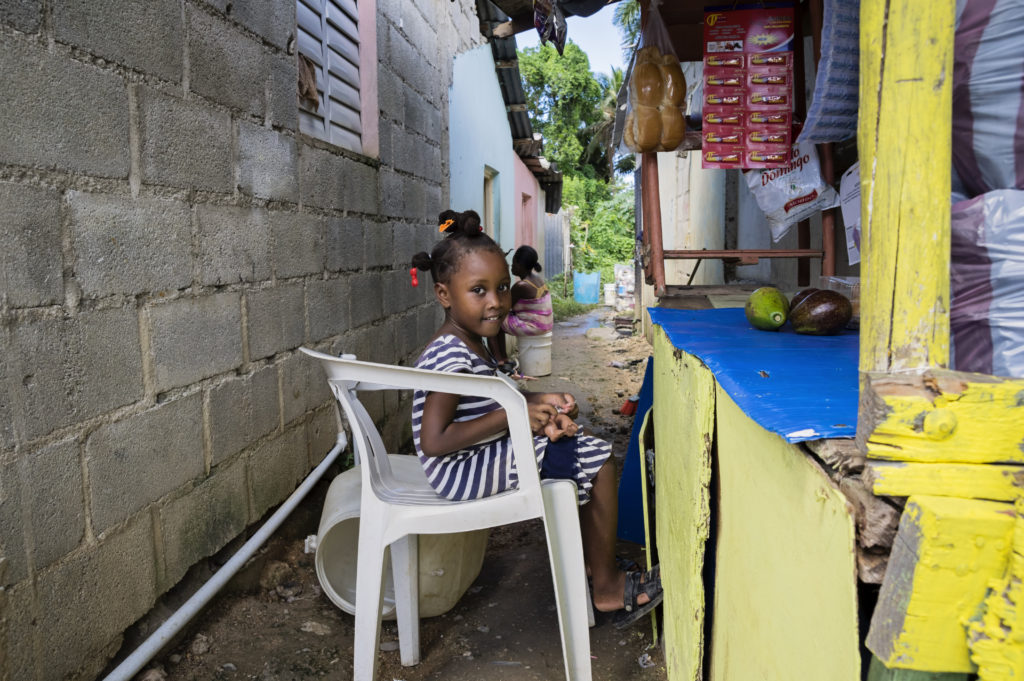
These few provisions are the only available provisions delimiting the work of children. There are no further provisions on working hours, the minimum age for hazardous work, or other forms of work harmful to children. Dominica has been criticized for not criminalizing child labor outside the realm of international human trafficking (USA Department of International Labor Affairs, 2020). Furthermore, while it has ratified the CRC Protocol on Children and pornography, the Dominican law does not in itself prohibit the use of children for pornography.
Child marriage
The legal age of marriage for both men and women is 18 years old. However, there are legal exceptions allowing any person as young as 16 to marry, with either parental consent or consent from a judge (OECD, 2019). As a consequence, child marriage remains a reality in Dominica.
This is not an isolated case in the Caribbean islands as many of the English-speaking Commonwealth Caribbean territories continue to recognize child marriage, to this date (for instance Belize, the Bahamas, Jamaica, St Vincent and the Grenadines). UNICEF reports that one in four women in the Caribbean is first married or in a union prior to her eighteenth’s birthday (Bardoo 2022). There is no data available for Dominica.
Written by Léa Allix
Last updated on April 10, 2022
Bibliography:
Bardoo, J. (s.d.). It is 2022 and child marriage is still legal in SVG. Retrieved from https://www.searchlight.vc/empowerment/2022/02/15/it-is-2022-and-child-marriage-is-still-legal-in-svg/ , accessed on 2 April 2022.
Children and Young Persons Welfare Act. (1972). Revrieved from https://www.ilo.org/dyn/natlex/docs/ELECTRONIC/75162/87811/F1971123467/DMA75162.pdf, accessed on 2 April 2022.
Children and Young Person Act. (1991). Retrieved from http://www.dominica.gov.dm/laws/chapters/chap37-50.pdf, accessed on 2 April 2022.
Education Act. (1997). No.11. Retrieved from https://www.ilo.org/dyn/natlex/docs/ELECTRONIC/48075/87760/F31460592/DMA48075.pdf, accessed on 3 April 2022
End Corporal Punishment. (2019). Corporal punishment of children in Dominica. Retrieved from http://www.endcorporalpunishment.org/wp-content/uploads/country-reports/Dominica.pdf, accessed on 3 April 2022
OECD. (2019). Gender Index: Dominica. Retrieved from https://www.genderindex.org/wp-content/uploads/files/datasheets/2019/DM.pdf, accessed on 6 April 2022
UNDP. (2020). Human Development Index Ranking. Retrieved from https://www.hdr.undp.org/?utm_source=EN&utm_medium=GSR&utm_content=US_UNDP_PaidSearch_Brand_English&utm_campaign=CENTRAL&c_src=CENTRAL&c_src2=GSR&gclid=Cj0KCQjw6J-SBhCrARIsAH0yMZgQsG3J9-5zCd3TRMSMyTRVeXbobC1DIiyODgdIXGuunEpbQ7kR27waAumtEALw_wcB, accessed on 1 April 2022.
UNGA. (2019). Universal Periodic Review Report on Dominica.Retrieved from https://documents-dds-ny.un.org/doc/UNDOC/GEN/G19/042/44/PDF/G1904244.pdf?OpenElement, accessed on 10 April 2022.
UNICEF. (2017). Situation analysis of children- Commonwealth of Dominica. Retrieved from https://www.unicef.org/easterncaribbean/media/891/file/Situation-Analysis-of-Children-2017.pdf, accessed on 10 April 2022
UNICEF. (2021). The Well-being of young people in Dominica.Retrieved from https://www.unicef.org/easterncaribbean/media/2966/file/GenU%20Dominica%20fact%20sheet.pdf, accessed on 5 April 2022.
USA Department of International Labor Affairs. (2020). 2020 Findings on the Worst Forms of Child Labor: Dominica.Retrieved from https://www.dol.gov/sites/dolgov/files/ILAB/child_labor_reports/tda2020/Dominica.pdf, accessed on 2 April 2022
USA Department of State. (2020). Country Report on Human Rights Practices for 2020: Dominica.Retrieved from https://www.state.gov/wp-content/uploads/2021/03/DOMINICA-2020-HUMAN-RIGHTS-REPORT.pdf, accessed on 1 April 2022
[1] This article by no means purports to give a full or representative account of children’s rights in Dominica; indeed, one of the many challenges is the scant updated information on the Dominican children, much of which is unreliable, not representative, outdated or simply non-existent.

